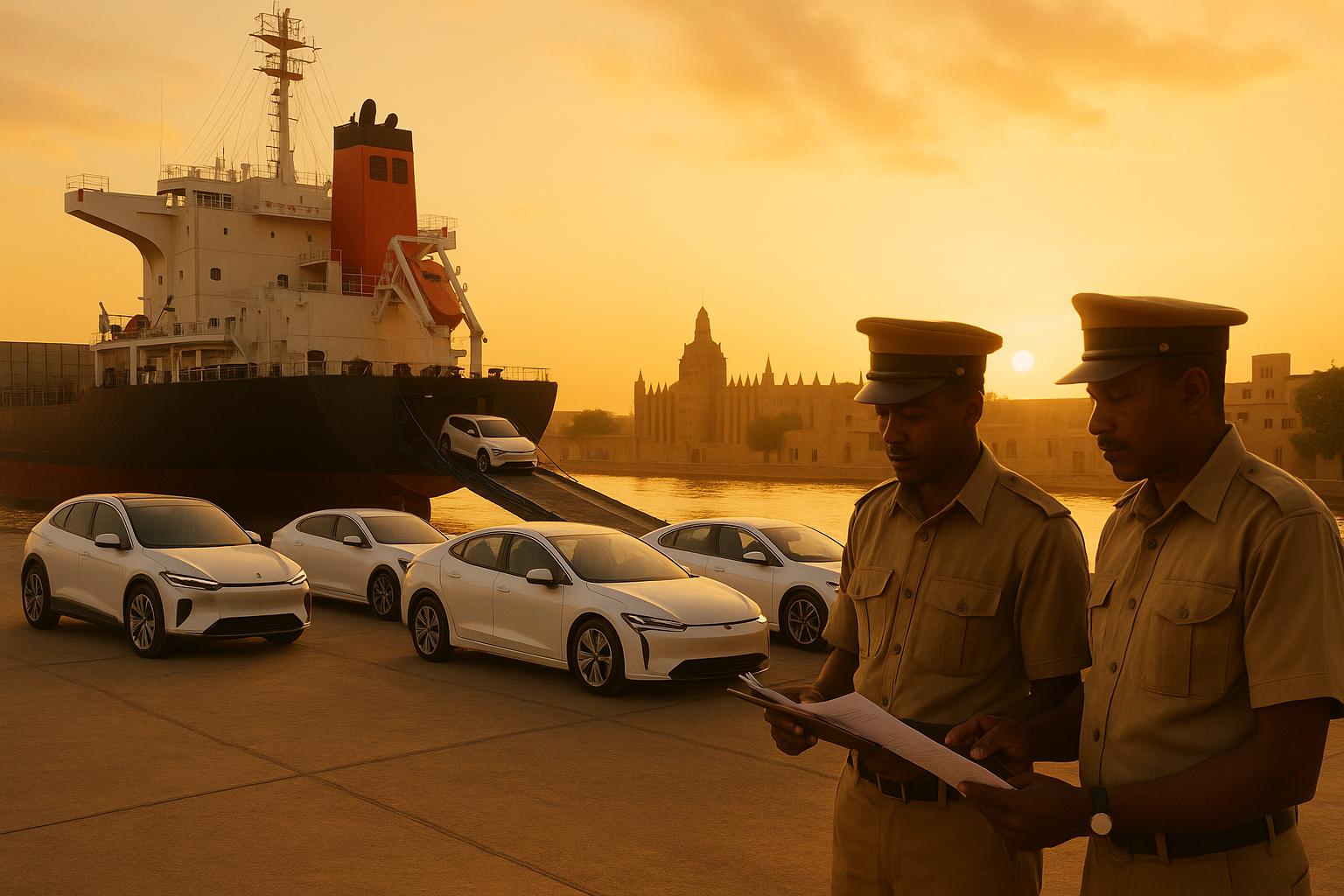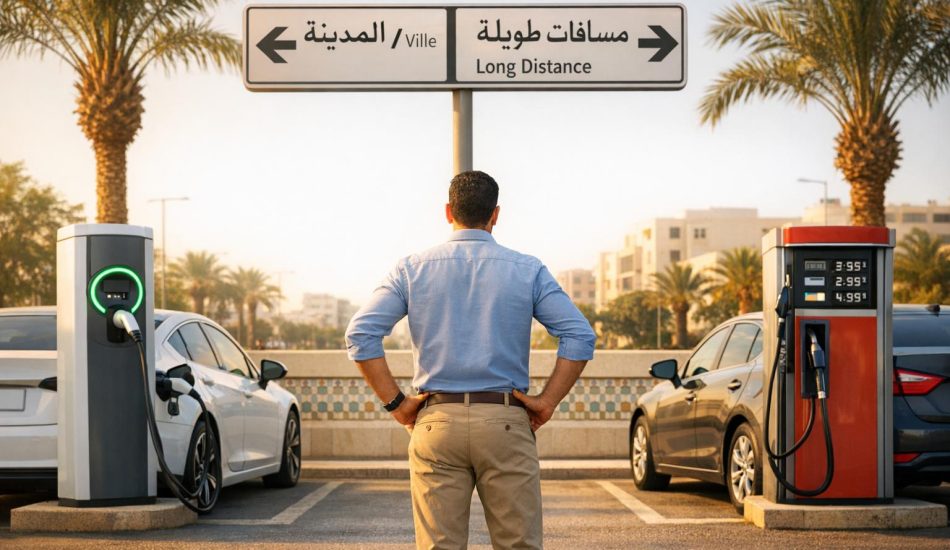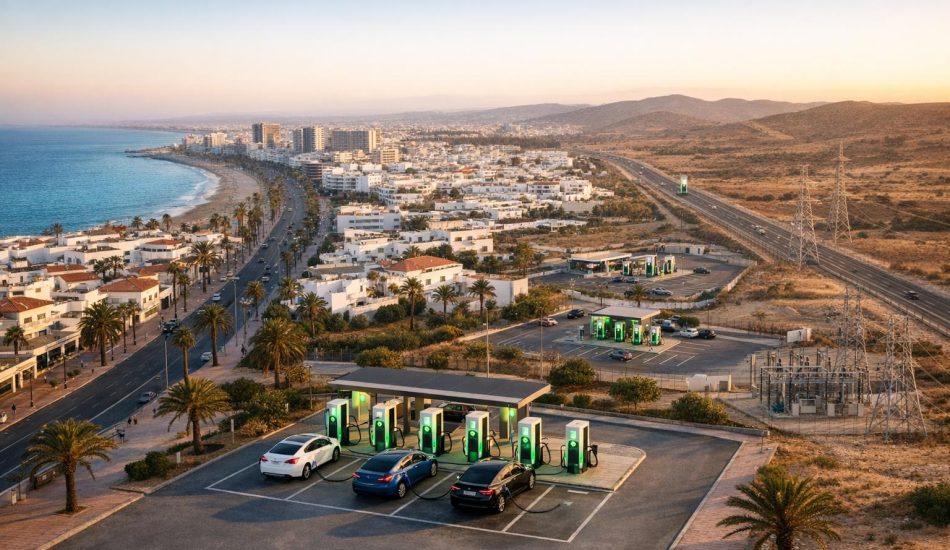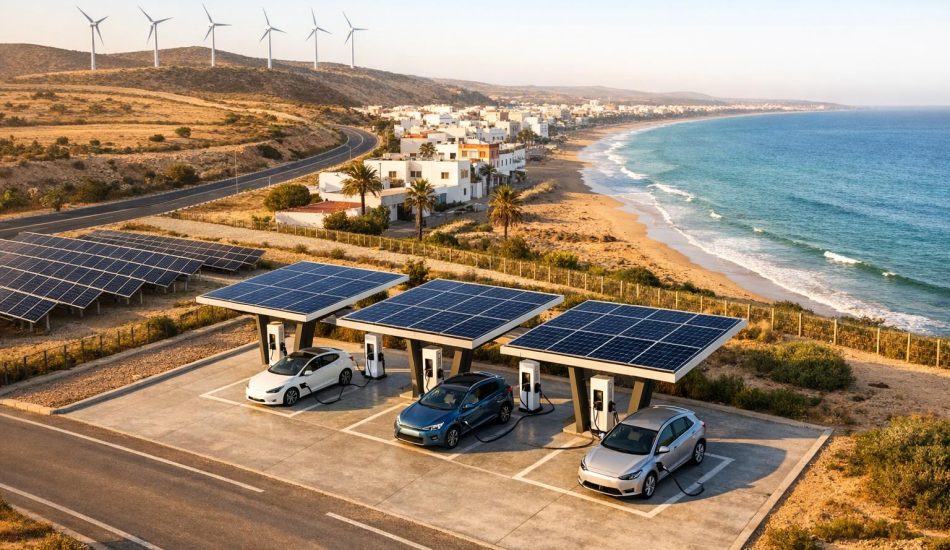
Mali is making electric vehicle (EV) imports more affordable and accessible in 2025. Here’s what you need to know:
- Zero VAT and Customs Duties: Fully electric vehicles are exempt from VAT (16.5%) and customs duties (25%), leading to significant cost savings. Hybrid vehicles get partial reductions but not full exemptions.
- Vehicle Age Rules: EVs under 10 years old qualify for tax exemptions. Older EVs may face extra taxes and duties.
- Shipping Costs: Transporting EVs to Mali via regional ports like Dakar costs between $1,200 and $1,700, with additional inland transport fees.
- Battery Safety Regulations: Lithium-ion batteries must meet strict international shipping protocols, including partial discharge and proper labeling.
- Government Support: Mali is committed to clean energy, aiming for 58.3% renewable energy by 2030. EV incentives align with this goal.
- Challenges: Infrastructure issues, climate impacts on roads, and electricity shortages can complicate logistics.
For smooth imports, ensure proper documentation, stay updated on regulations, and consider platforms like EV24.africa for assistance with logistics and compliance.
Electric Cars, Mega Mines & Food Revolution SHOCKING the World! Inside Mali’s Industrial BOOM.
Import Process and Required Documentation
Importing electric vehicles (EVs) into Mali involves navigating a well-defined process with strict attention to paperwork and compliance with local regulations. Businesses planning to bring EVs into the country must first establish their legitimacy and ensure they have all required documentation in place. Fortunately, most of this paperwork can be prepared quickly once business credentials are verified.
Required Documents for EV Imports
Having the right documentation is crucial for a smooth import process. To begin, businesses must provide proof of official business status, which confirms their legal ability to import vehicles into Mali. This step is essential to establish compliance with local regulations.
Most of the necessary documents can be secured within a single day after verifying business credentials. For detailed instructions on the required paperwork and procedures, importers can consult the Mali Trade Portal (https://tradeportal.ml) or the Customs Office website (https://douanes.gouv.ml/).
Once the documentation is ready, it’s important to confirm that the vehicle’s age and condition align with Mali’s standards.
Vehicle Age and Condition Rules
Mali has specific rules regarding the age of imported vehicles. For combustion-engine vehicles, the country enforces a strict 10-year age limit. Vehicles exceeding this limit incur additional taxes and duties. However, EVs are not subject to this age restriction unless they are over 10 years old, in which case extra costs may apply.
"Vehicles older than 10 years are subject to extra taxes and duties to be imported it in Mali." – BR LOGISTICS USA INC
If you plan to import an EV that is more than a decade old, it’s a good idea to contact Customs – GRA in Bamako to confirm any additional requirements.
While age and condition rules are important, ensuring compliance with battery safety regulations is equally critical during the importation process.
Battery Safety and Shipping Rules
Transporting EV batteries requires strict adherence to international safety protocols. Lithium batteries are classified as dangerous cargo due to the risk of overheating and catching fire. To address these risks, international organizations like the International Maritime Organization (IMO) and the International Air Transport Association (IATA) have established guidelines for shipping lithium-ion batteries by air and sea. The International Maritime Dangerous Goods (IMDG) Code also includes provisions for handling these batteries safely.
One key requirement is that EV batteries often need to be partially discharged before shipping to meet safety standards. This is referred to as maintaining the battery below a specific "state of charge" (SOC). Additionally, batteries are categorized under UN codes 3480 (if shipped alone) and 3481 (if shipped with equipment) and must be packaged in UN-approved materials that are resistant to shocks, fire, and leaks. Proper hazard labels, including a "battery on fire" pictogram, UN numbers, and "dangerous goods" warnings, are mandatory.
To ensure safe handling, all staff involved in the shipping process must receive ADR training for managing hazardous materials. Failing to use correct labels or packaging can lead to delays or even safety hazards.
Given the evolving nature of these regulations, importers should always verify the latest requirements when quoting or booking shipments. Staying up-to-date with current rules is essential to avoid complications during transport.
Import Costs: Duties, Taxes, and Fees
Bringing electric vehicles (EVs) into Mali comes with specific costs, even with the government’s push to promote cleaner transportation. The total expense depends on factors like the vehicle’s value, shipping method, and Mali’s current policies. Let’s break this down into key areas: customs duties, additional fees, and the cost differences between new and used EVs.
Customs Duties and VAT Rates
Mali provides a significant incentive for EV importers by exempting fully electric vehicles from both VAT and customs duties. In contrast, traditional gasoline and diesel vehicles are subject to a 44% customs duty based on their value, along with an 18% VAT on all vehicle imports. The Ministry of the Economy of Mali has also introduced exemptions from internal taxes and a gradual reduction of import duties for traditional, hybrid, and electric vehicles. However, it’s important to note that only fully electric vehicles qualify for the complete exemption, while hybrid models may receive partial reductions.
Additional Import Fees
Even with tax exemptions for EVs, importers still face several other costs. Shipping is one of the biggest expenses. Transporting a vehicle from European ports to Mali can cost between $1,462 and $1,989, depending on the departure port and shipping method. For instance, shipping a car from Rotterdam or Amsterdam typically falls between $1,192 and $1,692. Since Mali is landlocked, vehicles often enter through regional ports like Dakar, which adds inland transport costs to Bamako.
Other fees include port handling charges and inspection fees. Mali uses the CIF (Cost, Insurance, and Freight) method to calculate duties and taxes, which factors in both the vehicle’s value and shipping costs. Additionally, import customs brokers charge fees for handling the necessary clearance paperwork with local authorities.
Cost Comparison: New vs Used EVs
The tax exemptions make EV imports especially appealing, whether for new or used models. For example, a new EV priced at $30,000 avoids about $18,600 in taxes compared to a gasoline car. Similarly, a three-year-old EV valued at $18,000 saves approximately $11,160 in taxes. Shipping costs, which range from $1,200 to $1,700, remain consistent regardless of the vehicle’s age. These savings make used EVs a cost-effective choice for many buyers.
Adding to the local market perspective, Mali also offers an alternative with the locally assembled Tito city car, priced around $15,000. While about 100 units were sold last year, imported EVs often provide advanced features and competitive pricing, offering a strong option for those seeking more modern technology.
Government Incentives and 2025 Policy Changes
Mali is taking bold steps to encourage the adoption of electric vehicles (EVs) through a mix of generous incentives and clear-cut policies. By prioritizing sustainable transportation, the government has created a favorable environment for EV importers, offering substantial cost savings compared to traditional vehicles.
Available Tax Breaks and Incentives
At the heart of Mali’s EV strategy is a comprehensive tax exemption for fully electric vehicles. In contrast, conventional vehicles face steep taxes, making EVs a more appealing option for importers.
Here’s a breakdown of the tax differences:
| Tax Type | Conventional Vehicles | Electric Vehicles |
|---|---|---|
| Import Duty | 25% | 0% |
| Excise Tax (if applicable) | 10% | 0% |
| VAT | 16.5% | 0% |
In addition to waiving VAT and import duties, Mali also eliminates internal taxes for fully electric vehicles. Even hybrid vehicles see a gradual reduction in import duties, although they don’t enjoy the same level of savings as their fully electric counterparts.
These policies not only reduce costs but also signal the government’s commitment to expanding access to EVs and evolving its policies to accommodate future growth.
Who Qualifies for Incentives
The full tax exemption benefits are reserved exclusively for 100% electric vehicles. Hybrid models, while eligible for some duty reductions, do not qualify for the complete exemption package offered to fully electric vehicles.
Importantly, these incentives are open to all importers, regardless of their size or nationality. However, vehicles must meet Mali’s technical standards and pass necessary inspections to qualify. For Malian residents, this presents an excellent opportunity to explore the growing range of EV options and take advantage of the financial perks.
New 2025 Policy Changes
Looking ahead to 2025, Mali is maintaining its strong support for EV adoption. The government’s tax exemption framework remains unchanged, providing a stable policy environment that reassures importers as they plan their purchases.
In 2025, EVs accounted for 7.8% of vehicle sales – a clear sign of growing consumer interest and confidence. This momentum is reinforced by Mali’s tiered tax system, which continues to offer full exemptions for fully electric vehicles while granting partial reductions for hybrids. Such policies encourage a gradual shift toward cleaner transportation options.
The stability of Mali’s 2025 policies gives importers the confidence to make long-term investment decisions, knowing the financial benefits of EV adoption remain secure. This consistency supports both individual buyers and businesses in their transition to more sustainable transportation solutions.
sbb-itb-99e19e3
Tips for Importing EVs to Mali
Mali’s regulatory framework makes the import process straightforward, provided all necessary steps are followed. Importing an electric vehicle (EV) into Mali requires careful preparation, proper documentation, and keeping up with any changes in regulations.
How to Meet Import Requirements
Start by gathering all the necessary paperwork. Work with certified shipping companies that adhere to safety standards and handle dangerous goods declarations. A pre-shipment inspection is essential to ensure the vehicle meets safety and condition requirements.
It’s also wise to establish a system for tracking compliance from the outset. With EV regulations evolving, staying updated on changes can save time and prevent unexpected delays. If you’re managing larger or frequent imports, hiring professional trade advisors can make the process smoother.
To simplify things further, explore digital platforms that can help manage these procedures efficiently.
Using EV24.africa for EV Imports

Digital platforms have become invaluable for navigating EV imports, and EV24.africa is one such tool designed to align with Mali’s import policies.
EV24.africa connects buyers with verified sellers across 54 African countries, handling complex shipping logistics while offering transparent pricing and flexible financing options to make premium EVs more accessible.
The platform ensures that all listed vehicles meet import standards through a thorough verification process. Each listing includes detailed specifications such as battery health reports for used EVs and the status of compliance documentation, helping buyers make informed choices. EV24.africa also supports customs clearance and arranges final delivery to your preferred location in Mali.
For added confidence, the platform features a customer review system where previous importers share their experiences. If you’re a dealer or business importing multiple vehicles, EV24.africa offers bulk import services that reduce costs and streamline the process, all backed by a reliable dealer verification program.
Import Challenges and Restrictions
Mali’s regulatory framework outlines clear rules for importing EVs, but practical obstacles can make the process more complicated. Being aware of these challenges is essential for importers to manage their timelines and budgets effectively. Below, we explore the key issues related to shipping and infrastructure.
Shipping and Infrastructure Problems
Mali’s transportation system faces significant hurdles, many of which stem from climate-related disruptions. The country’s road network often experiences damage from extreme weather, leading to delays in deliveries.
In May 2025, the World Bank approved a $219.8 million investment for the Mali Connectivity and Road Resilience Project, with support from the Global Center on Adaptation (GCA). This initiative aims to upgrade 87 miles (about 140 kilometers) of the Diéma–Sandaré section along the Northern Bamako–Dakar Corridor, improving both connectivity and resilience to climate challenges.
"This project is a lifeline for millions of Malians. Climate-resilient roads are not only essential to economic growth, but also to food security, maternal healthcare, and regional integration." – Professor Patrick Verkooijen, President and CEO of the Global Center on Adaptation
The impact of extreme weather is evident. Flooding in 2024 affected over 350,000 people, highlighting how vulnerable Mali’s transportation networks are to such events.
Electricity infrastructure presents another major challenge. Approximately 60% of Mali’s electricity comes from hydroelectric sources, which are highly sensitive to climate fluctuations. In 2024, electricity demand rose by 8%, reaching 1,200 MW, but production capacity stagnated at around 800 MW. This shortfall forced Mali to import about 30% of its electricity. Frequent power outages cost the country nearly 2% of its GDP annually.
Changing Regulations and Costs
Beyond logistical issues, shifting regulations add another layer of complexity. Mali’s import rules have seen rapid changes, including adjustments to tariff structures. In May 2025, a 25% tariff on imported vehicles was introduced, followed by another 25% tariff on auto parts in June 2025. These changes have directly impacted import costs and require businesses to rethink their strategies. For instance, battery cells may see price increases of up to 51% if graphite costs rise due to these tariffs.
"The future of mobility, and the deals that shape it, will belong to those who act with speed, focus and flexibility." – Mark Williams, Global Chief Revenue Officer, Datasite
Key Points for Mali EV Importers
Importing EVs into Mali involves several critical steps, each requiring attention to detail:
- Export the vehicle from its origin port.
- Validate export documentation with customs.
- Ship the vehicle to a regional port, typically Dakar.
- Transport the vehicle into Mali and complete local import procedures.
Having the right paperwork is non-negotiable. Make sure you have the original state title, a bill of sale, detailed vehicle specifications, and shipper and consignee details to avoid unnecessary delays. Once your documentation is sorted, it’s time to focus on the financial side of things.
The financial aspects of EV imports in Mali come with both advantages and hurdles. Mali offers various incentives, which can lead to considerable savings compared to importing traditional vehicles. However, the country’s landlocked geography introduces logistical challenges, potentially impacting shipping timelines and overall efficiency. Staying informed about shifting regulations is also crucial to avoid unexpected costs or delays.
To simplify the process, consider leveraging trusted digital tools like EV24.africa. These platforms can help with documentation and logistics, ensuring smoother operations.
Lastly, keep an eye on regulatory changes to adapt your strategy as needed. Mali’s regulatory framework is evolving, and import costs may fluctuate over time. Success in this market hinges on thorough preparation, taking advantage of available incentives, and partnering with experienced professionals to navigate the complexities.
FAQs
What documents are needed to import an electric vehicle into Mali, and how can businesses meet the country’s regulations?
To bring an electric vehicle into Mali, you’ll need to gather a few important documents, such as:
- Original bill of lading
- Commercial invoice
- Certificate of origin
- Import permit
- Proof of compliance with safety and environmental standards
To navigate Mali’s import regulations smoothly, it’s a good idea to collaborate with licensed customs brokers. Make sure all your paperwork is accurate and complete, and keep an eye on any updates to the country’s import policies and tariffs. Staying ahead of these details can help you avoid unnecessary delays or penalties.
What challenges do Mali’s infrastructure issues, like road conditions and electricity shortages, pose for importing and using electric vehicles?
Mali faces several infrastructure hurdles that complicate the adoption of electric vehicles (EVs). Poor road conditions and frequent electricity shortages are at the heart of these challenges, creating obstacles both for importing EVs and for setting up the necessary charging networks.
An unreliable electricity supply makes establishing charging stations a tough task, while the country’s rough and poorly maintained roads can take a toll on the durability and performance of EVs. These combined issues not only drive up transportation and maintenance costs but also highlight the need for thoughtful planning and targeted investments to address these barriers.
What are the cost differences between importing a new versus a used electric vehicle into Mali, factoring in tax exemptions and shipping fees?
Importing a brand-new electric vehicle (EV) into Mali can be a smart way to save money. Why? New EVs come with zero import duties and VAT, which drastically cuts down their overall cost. On the other hand, used EVs face much steeper import duties, usually falling between 25% and 35%, making them considerably pricier.
Although shipping costs are fairly consistent for both new and used vehicles, the hefty tariffs on used EVs can quickly drive up the total expense. If keeping costs low is your priority, going for a new EV is often the better financial decision.




